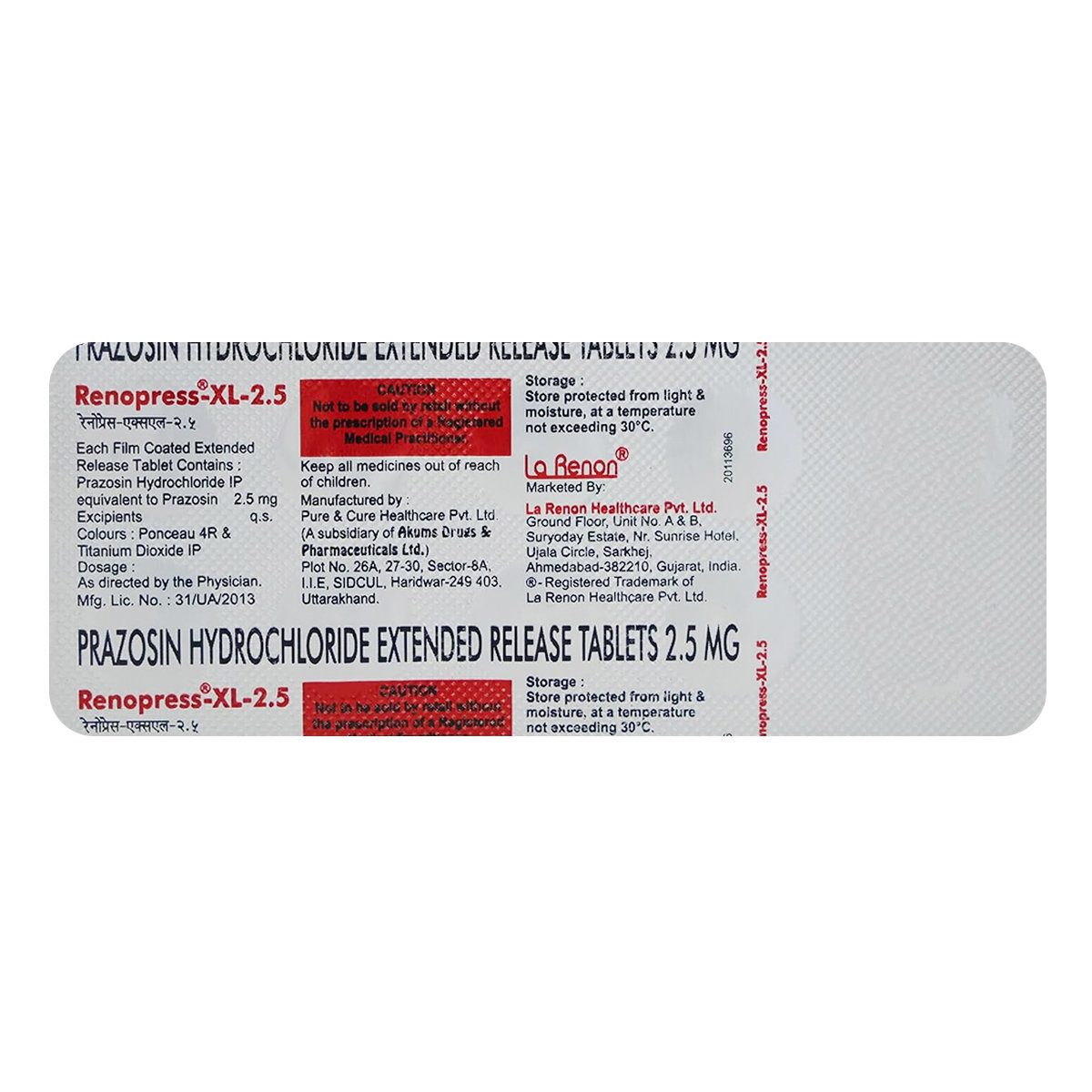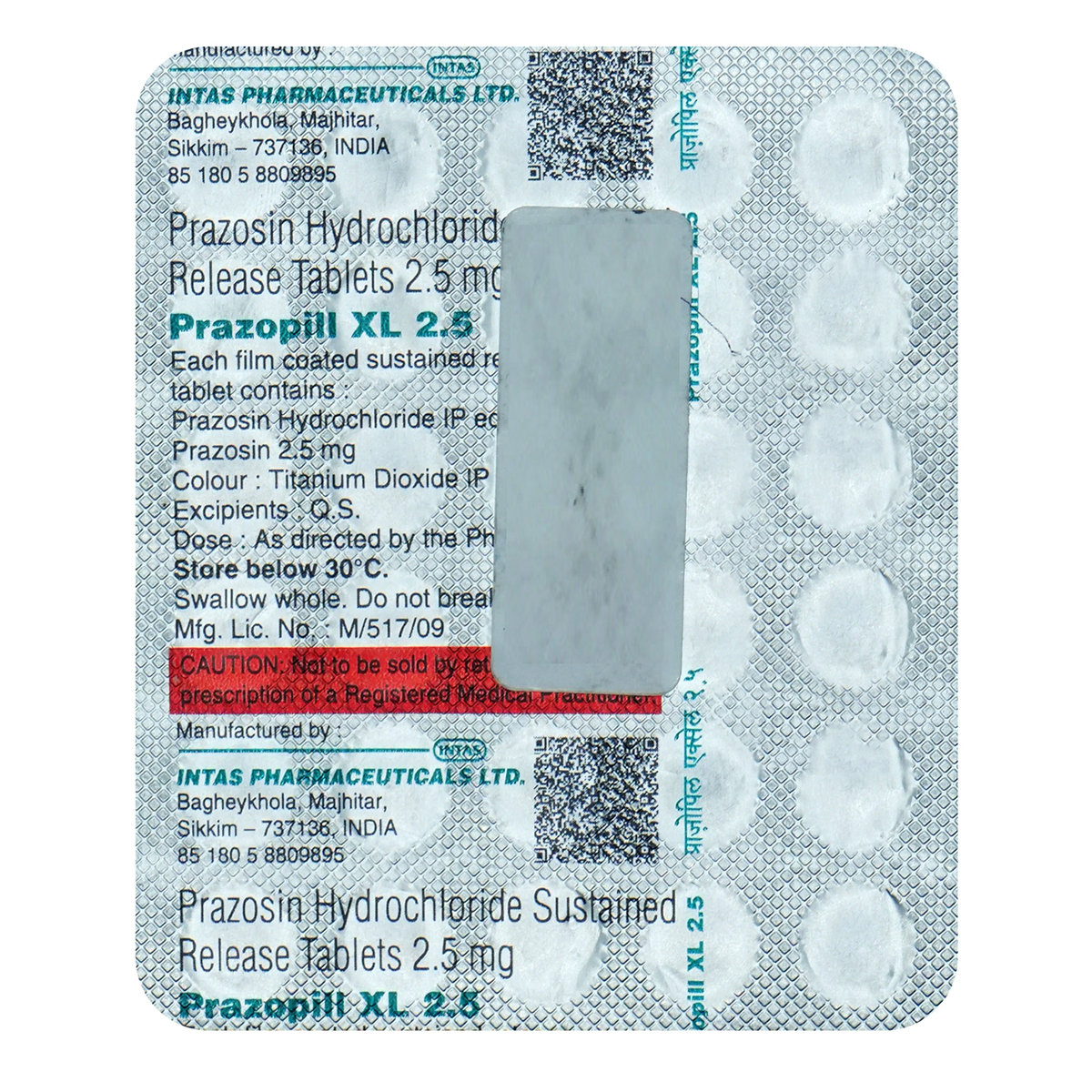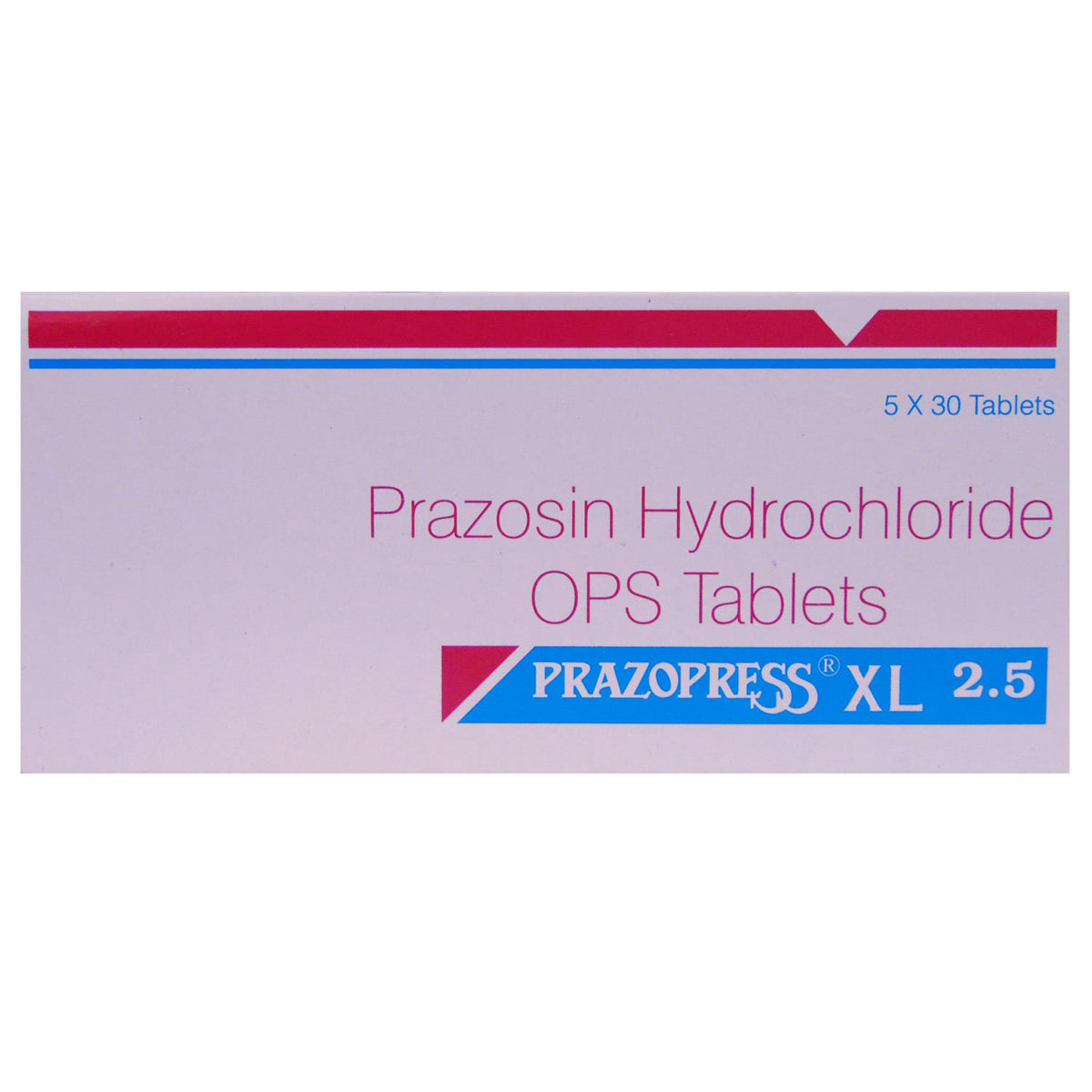Prazopill XL 2.5 mg Tablet 15's
MRP ₹349
(Inclusive of all Taxes)
₹52.4 Cashback (15%)
Selected Pack Size:15
15 ₹314.1
(₹20.94 per unit)
Out of stock
30 ₹323.6
(₹10.79 per unit)
In Stock
Provide Delivery Location
Online payment accepted
 Prescription drug
Prescription drugWhats That
Composition :
Manufacturer/Marketer :
Consume Type :
Expires on or after :
Return Policy :
About PRAZOPILL XL 2.5MG TABLET
PRAZOPILL XL 2.5MG TABLET contains an 'anti-hypertensive' medication primarily used to treat hypertension (high blood pressure) and lower any future risk of heart attack and stroke. In addition to this, it is also used to treat mild prostate gland enlargement in men (known as Benign Prostate Hyperplasia) and treating heart failure. Hypertension (high blood pressure) is a lifelong or chronic condition in which the blood pressure against the artery walls becomes high. The higher this blood pressure, the harder the heart has to pump.
PRAZOPILL XL 2.5MG TABLET contains Prazosin, an alpha-blocker, primarily used to treat hypertension (high blood pressure). It acts by relaxing the blood vessels, reducing the heart's workload, and making the heart more efficient at pumping blood throughout the body. Thus, it helps to lower high blood pressure, reducing the chances of any future heart attack or stroke.
Take PRAZOPILL XL 2.5MG TABLET as prescribed by your doctor. You are advised to take PRAZOPILL XL 2.5MG TABLET for as long as your doctor has prescribed it for you, depending upon your medical condition. The most common side effects of PRAZOPILL XL 2.5MG TABLET are drowsiness, headache, weakness, dizziness, priapism (prolonged erections), nausea, and feeling exhausted. They do not require medical attention and gradually resolve over time. However, if the side effects are persistent, reach out to your doctor.
It is advisable to drink plenty of fluids while taking this medicine. Lifestyle changes are beneficial in achieving optimum outcomes with PRAZOPILL XL 2.5MG TABLET and keeping blood pressure under check. A low salt diet, daily physical activity (even 20-30 minute brisk walking for 5 days a week can help, losing weight in case of people who are obese), etc., are the mainstay of treatment of hypertension. Inform your doctor if you have had an allergic reaction to PRAZOPILL XL 2.5MG TABLET , are pregnant or are planning to get pregnant, are breastfeeding, have liver disease, kidney disease, heart failure, a heart valve problem, or a history of a heart attack.
Uses of PRAZOPILL XL 2.5MG TABLET
Directions for Use
Key Benefits
PRAZOPILL XL 2.5MG TABLET is primarily used to treat hypertension (high blood pressure) and lower the risk of future heart attack and stroke. It is also used to treat mild prostate gland enlargement in men (known as Benign Prostate Hyperplasia) and treating heart failure. PRAZOPILL XL 2.5MG TABLET contains Prazosin, an alpha-blocker that acts by widening and relaxing the blood vessels, reducing the heart's workload, and making the heart more efficient at pumping blood throughout the body. Thus, it reduces high blood pressure and reduces the chances of a future heart attack or stroke.
Storage
- Do not stand up suddenly. Lie down and get up slowly only when you feel better.
- Avoid alcohol and large meals.
- Drink enough water before standing for long periods.
- Exercise regularly; however, avoid exercising in extreme heat.
- Eat small, low-carb meals.
- Wear compression stockings.
- Get enough sleep. Maintain a regular sleep cycle.
- Eat a healthy diet and exercise regularly.
- Manage stress with yoga or meditation.
- Limit alcohol and caffeine.
- Avoid driving or operating machinery unless you are alert.
- Tell your doctor immediately if you experience shortness of breath after taking medication.
- Your doctor may adjust the medication regimen or dosage or give alternative medical procedures to minimize the symptoms of shortness of breath.
- Monitor your oxygen levels and breathing rate regularly to track changes and potential side effects.
- For controlling stress and anxiety, try relaxation techniques like deep breathing exercises, meditation, or yoga.
- Make lifestyle changes, such as quitting smoking, exercising regularly, and maintaining a healthy weight.
- Seek emergency medical attention if you experience severe shortness of breath, chest pain, or difficulty speaking.
- Follow up regularly with your doctor to monitor progress, adjust treatment plans, and address any concerns or questions.
- Reduce salt intake to minimize fluid buildup.
- Use compression stockings, sleeves, or gloves.
- Gently massage the affected area towards the heart.
- Protect the swollen area from injury and keep it clean.
- Use lotion or cream to keep the skin moisturized.
Drug Warnings
PRAZOPILL XL 2.5MG TABLET should not be given to the people allergic to PRAZOPILL XL 2.5MG TABLET , have low blood pressure (less than 90 mm of Hg), have had a heart attack, kidney disease, liver disease, pregnant women or planning to get pregnant and breastfeeding women without the prescription of a doctor. Besides this, it is contraindicated in patients with aortic stenosis (heart valve problem). PRAZOPILL XL 2.5MG TABLET can pass into breast milk, but its effect on the baby is not known. So, it is better to tell your doctor if you are taking PRAZOPILL XL 2.5MG TABLET and breastfeeding. As with all alpha-blockers (blood pressure-lowering pills), PRAZOPILL XL 2.5MG TABLET may cause sudden loss of consciousness due to a sudden dip in the blood pressure with heart rates of 120–160 beats per minute. Low blood pressure (hypotension) may develop in patients given PRAZOPILL XL 2.5MG TABLET who are also receiving a beta-blocker (blood pressure-lowering pills) such as propranolol. Dizziness, light-headedness, or fainting may occur, especially when rising from a lying or sitting position due to postural hypotension. Getting up slowly may help lessen the problem. During cataract surgery, an eye problem known as Intraoperative Floppy Iris Syndrome (IFIS) has been associated with alpha-1 blocker therapy (blood pressure-lowering pills). If you are undergoing any planned eye surgery, let your doctor know that you are taking PRAZOPILL XL 2.5MG TABLET .
Drug-Drug Interactions
Drug-Drug Interactions
Login/Sign Up
Taking Tizanidine and Prazopill XL 2.5 mg Tablet together may have additive effects in lowering your blood pressure.
How to manage the interaction:
Taking tizanidine and Prazopill XL 2.5 mg Tablet together can possibly result in an interaction, but it can be taken if your doctor has advised it. Consult your doctor immediately if you experience headaches, dizziness, lightheadedness, fainting, and/or changes in pulse or heart rate. It is advised not to drive or use any hazardous machinery. Do not stop using any medications without a doctor's advice.
Taking Prazopill XL 2.5 mg Tablet and Sodium oxybate together can increase the risk of side effects.
How to manage the interaction:
Although taking Prazopill XL 2.5 mg Tablet and sodium oxybate together can evidently cause an interaction, it can be taken if your doctor has suggested it. Consult your doctor immediately if you experience drowsiness, dizziness, lightheadedness, confusion, depression, low blood pressure, slow or shallow breathing, and impairment in thinking or judgement. It is advised not to drive or use any hazardous machinery. Do not discontinue any medications without first consulting your doctor.
Drug-Food Interactions
Drug-Food Interactions
Login/Sign Up
Diet & Lifestyle Advise
- Keep your weight under control with a BMI of 19.5-24.9.
- Do regular physical activity or exercise for at least 150 minutes per week, or about 30 minutes most days of the week. Doing this can help you to lower your raised blood pressure by about 5 mm of Hg.
- Opt for a diet rich in whole grains, fruits, veggies, and low-fat dairy products.
- Limit intake of sodium chloride (table salt) in your daily diet to 2300 mg per day or less than 1500 mg is ideal for most adults.
- If you are taking alcohol, then only one serving for women and two servings for men is advisable.
- Quitting smoking is the best strategy to lower the risk of heart disease.
- Avoid chronic stress as it can raise your blood pressure. Try to enjoy and spent time with your loved ones to cope with stress and practice mindfulness techniques.
- Monitor your blood pressure daily and if there is too much fluctuation, then immediately contact your doctor.
- Try to include heart-healthy omega 3 fatty acid-containing food drinks in your daily diet. You can also use low-fat cooking oil like olive oil, soybean oil, canola oil, and coconut oil to lower your elevated blood pressure.
Side Effects of PRAZOPILL XL 2.5MG TABLET
- Drowsiness
- Headache
- Lack of energy, weakness
- Dizziness
- Palpitations
- Lightheadedness
- Priapism (prolonged erections)
- Nausea
- Feeling exhausted
Habit Forming
Therapeutic Class
All Substitutes & Brand Comparisons
RX
Out of StockCzoprexx 2.5mg Tablet XL
CMG Biotech Pvt Ltd
₹55
(₹4.95 per unit)
76% CHEAPERRX
Out of StockCzopress 2.5mg Tablet XL
CMG Biotech Pvt Ltd
₹55
(₹4.95 per unit)
76% CHEAPERRX
Out of StockOsropres 2.5 XL Tablet
₹89
(₹8.01 per unit)
61% CHEAPER
Drug-Diseases Interactions
Drug-Diseases Interactions
Login/Sign Up
FAQs
Drug-Drug Interactions Checker List
- BENAZEPRIL
- METOPROLOL
- RAMIPRIL
- HYDROCHLOROTHIAZIDE
- ATORVASTATIN
- SIMVASTATIN
- SILDENAFIL
- CLARITHROMYCIN
- ERYTHROMYCIN
- RIFAMPICIN
- ITRACONAZOLE
- KETOCONAZOLE
- RITONAVIR
- CARBAMAZEPINE
- PHENYTOIN
- PHENOBARBITAL
- PRIMIDONE
- CYCLOSPORINE
- TACROLIMUS
- IBUPROFEN
- ASPIRIN
Special Advise
- Consumption of PRAZOPILL XL 2.5MG TABLET may cause dizziness. Avoid activities like driving while on this medication.
- A sudden drop in blood pressure may be seen while on this medication, leading to dizziness. Changing your posture at a slower rate might help counter this.
- Ankle swelling, which can be a sign of oedema, can be experienced as a side effect of this drug. Consult your doctor if this or other side effects cause trouble or are persistent.
Disease/Condition Glossary
Hypertension: Blood pressure is the measurement of the force that our heart uses to pump blood to all body parts. Hypertension is a chronic condition when blood pressure is too high. This condition can lead to hardened arteries (blood vessels), decreasing the blood and oxygen flow to the heart. Raised blood pressure can cause chest pain (angina) and heart attack (when blood supply to the heart is blocked). Additionally, high blood pressure also causes brain damage (stroke) and kidney failure. High blood pressure can be diagnosed with the help of a blood pressure monitor. Blood pressure is determined both by the amount of blood your heart pumps and the amount of resistance to blood flow in your arteries. The more blood your heart pumps and the narrower your arteries, the higher your blood pressure. Even without symptoms, damage to blood vessels and your heart continues and can be detected.
Benign prostatic hyperplasia (BPH): It is the enlargement of the prostate gland. It is a non-cancerous growth of the prostate gland caused due to overproduction of dihydrotestosterone hormone in men. After age 50, most men develop an enlarged prostate gland putting pressure on the urinary bladder. It leads to restricted or obstructed urine flow, the urge to urinate frequently (especially at night), and the feeling of not emptying the urinary bladder.
Raynaud's disease: Also known as cold finger syndrome it causes smaller arteries that supply blood flow to the skin to narrow in response to cold or stress. The affected body parts, especially fingers and toes, might turn white or blue with a cold feeling and numbness until circulation improves, usually when you get warm.

Have a query?
Alcohol
Safe if prescribed
You are recommended not to consume alcohol and PRAZOPILL XL 2.5MG TABLET to avoid unpleasant side effects like lowering blood pressure (hypotension).
Pregnancy
Consult your doctor
PRAZOPILL XL 2.5MG TABLET belongs to the pregnancy category C medicine. There is limited evidence regarding the use of PRAZOPILL XL 2.5MG TABLET and is generally not preferred as the initial treatment of hypertension in pregnancy. It is best to consult your doctor if you have high blood pressure during pregnancy.
Breast Feeding
Consult your doctor
Use of PRAZOPILL XL 2.5MG TABLET during breastfeeding has not been shown to cause any harmful effects in breastfed babies. If PRAZOPILL XL 2.5MG TABLET is required by the mother, it is not a reason to discontinue breastfeeding. If you are a nursing mother, it is best to consult your Obstetrician regarding the use of PRAZOPILL XL 2.5MG TABLET .
Driving
Safe if prescribed
Drive with caution, PRAZOPILL XL 2.5MG TABLET usually causes drowsiness and affects driving ability.
Liver
Consult your doctor
PRAZOPILL XL 2.5MG TABLET to be taken with caution, especially if you have or have had a history of liver disease. Your doctor will have to change the dosage depending on your medical condition and your reaction to treatment.
Kidney
Consult your doctor
PRAZOPILL XL 2.5MG TABLET is generally safe to prescribe in patients with kidney diseases, and dose adjustment is generally not required. However, your doctor will decide the appropriate dosage strength depending upon the severity of your condition.
Children
Safe if prescribed
PRAZOPILL XL 2.5MG TABLET can be given safely to children aged 6-12 years provided a child specialist has prescribed the dose. PRAZOPILL XL 2.5MG TABLET should not be given to the children without consulting a child specialist.
Recommended for a 30-day course: 2 Strips










